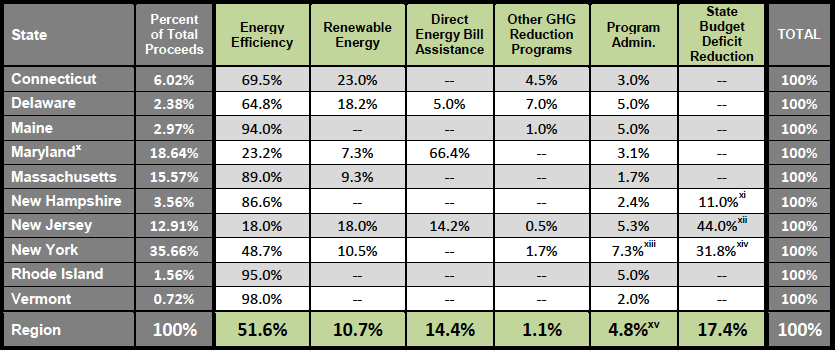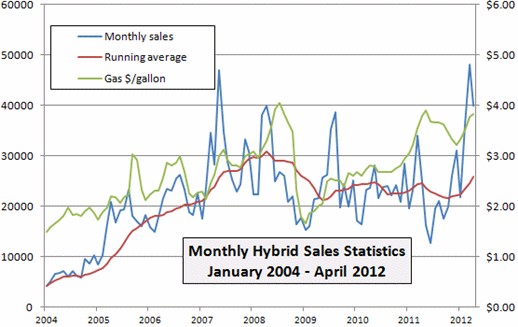A Real-World Example of Carbon Pricing Benefits Outweighing Costs
Posted on 5 March 2011 by dana1981
NOTE: This article has also been republished on Treehugger
The key obstacle to putting a price on carbon emissions in the USA is the fairly widespread myth that it will result in ballooning energy bills and cripple the economy. These myths perservere despite the fact that economic studies consistently find that the costs of carbon pricing proposals are very minimal, and the benefits consistently outweigh the costs several times over.
The flaw with these economic studies is that they're generally based on hypothetical legislation which has not been implemented. So it's easy for individuals who oppose carbon pricing to claim that they contain flawed assumptions, and thus dispute their conclusions. However, in 2008, ten northeastern states in the USA (Connecticut, Delaware, Maine, Maryland, Massachusetts, New Hampshire, New Jersey, New York, Rhode Island, and Vermont) implemented a carbon cap and trade system which will reduce their carbon dioxide (CO2) emissions from the power sector by 10% by 2018 in the Regional Greenhouse Gas Initiative (RGGI). The RGGI recently commissioned a study to examine the impacts of the system, and the results give us a real-world example which is broadly consistent with the economic study predictions of benefits outweighing costs.
All in all, through the first two years of the system, the ten states generated $789 million through the auctioning and direct sale of CO2 emissions allowances. Each state developed its own plan for investing those funds, but overall, 52% was used for energy efficiency programs, 14% for energy bill payment assistance, including assistance to low-income ratepayers, and 11% to accelerate deployment of renewable energy technologies. New York, New Hampshire, and New Jersey also diverted some of the funds to reduce their state budget deficits.
Table 1: Percent of RGGI State Investments By Category

Considering that energy efficiency is by far the most cost-effective way to reduce CO2 emissions, at about 2.5 cents to save a kilowatt-hour (kWh), whereas it costs at least 6 cents per kWh to generate electricity from conventional sources, it's not surprising that the RGGI states chose to invest the majority of the carbon allocation funds on energy efficiency programs.
The RGGI study provides us with a real-world example which busts the three main myths associated with carbon pricing; that it will (i) cripple the economy, (ii) kill jobs, and (iii) cause energy bills to skyrocket. The study found that in reality, investing the carbon funds in energy efficiency and renewable energy programs resulted in a net benefit to the states' economies:
"Evaluations of several energy efficiency and renewable energy programs in the RGGI participating states indicate that these programs provide $3-$4 in savings for every dollar invested. When macroeconomic benefits are considered, the benefits are even greater."
Note that this analysis does not include other benefits such as averting climate change or reducing emissions of co-pollutants. Despite this narrow focus, the carbon pricing system resulted in direct benefits exceeding costs several times over.
The RGGI report also found that the program has created jobs.
"A 2010 analysis by Environment Northeast estimates that energy efficiency programs funded with CO2 allowance proceeds through December 2010 are projected to create nearly 18,000 job years – that is, the equivalent of 18,000 full-time jobs that last one year. Employment benefits result from state program investments and from the reinvestment of consumer energy bill savings in the wider economy. While there has not yet been a similar analysis of RGGI-funded renewable energy programs, data from the Renewable Energy Policy Project shows every $1 million invested in renewable energy systems creates about six full-time manufacturing jobs, as well as additional jobs in construction and facility maintenance."
The myth that carbon pricing will result in much higher energy bills is based on the premise that utilities will pass on the price of carbon emissions to consumers. However, this assumption fails to account for the re-investment of the funds generated through carbon pricing. For example, as discussed above, the RGGI states invested two-thirds of their carbon funds into energy efficiency and energy bill payment assistance programs. As a result, the report found that individuals and businesses which took advantage of these programs saw their energy bills drop:
"At the household and business level, energy efficiency investments enhance consumers’ control over their energy use, typically reducing energy bills by 15 to 30 percent."
Overall, the RGGI program has provided us with a real-world example that carbon pricing can be successfully implemented at a minimal cost, and that its benefits can exceed its costs several times over.
Unfortunately, the New Hampshire House of Representatives recently voted to withdraw the state from RGGI. This despite the fact that New Hampshire used $3.1 million of their carbon allocation funds to reduce their state deficit, and invested another $24.4 million in energy efficency programs. The state had used those funds to help businesses and schools become more energy efficient, weatherize low-income homes, provide energy efficiency job training for more than 170 workers, and so on. New Hampshire Speaker William O’Brien justified the state's RGGI withdrawal:
"Eliminating RGGI sends a clear signal to the business community that we are reversing the direction that the state is taking in terms of creating a regulatory environment that is pro-business. That’s critical in terms of sending a strong message that we are open for business and ready to work with employers to help grow our economy and create good, new jobs here."
Apparently Mr. O'Brien considers it "pro-business" to eliminate a system which had created loans to help New Hampshire businesses lower energy expenses, and provided energy efficiency job training for hundreds of workers in the state. Unfortunately, New Hampshire serves as a reminder that myths about the effects of carbon pricing tend to have more impact than reality.
This post was written by Dana Nuccitelli (dana1981) has been incorporated into the Intermediate version of the skeptic argument "CO2 limits will harm the economy".































 Arguments
Arguments























 0
0  0
0 You should keep an eye on the FAO index, sure there will be ups and downs, but long-term that is going to skyrocket too.
You should keep an eye on the FAO index, sure there will be ups and downs, but long-term that is going to skyrocket too.








Comments